The latest revelation that’s truly disturbing comes from the DailyClout / War Room volunteers inPfizer Report 54. The core of the subject matter: child experimentation — with long-lasting adverse effects.
Report 54:“Infants and Children Under 12 Given the Pfizer mRNA COVID ‘Vaccine’ Seven Months BEFORE Pediatric Approval. 71% of Adverse Event Cases Classified as Serious.”
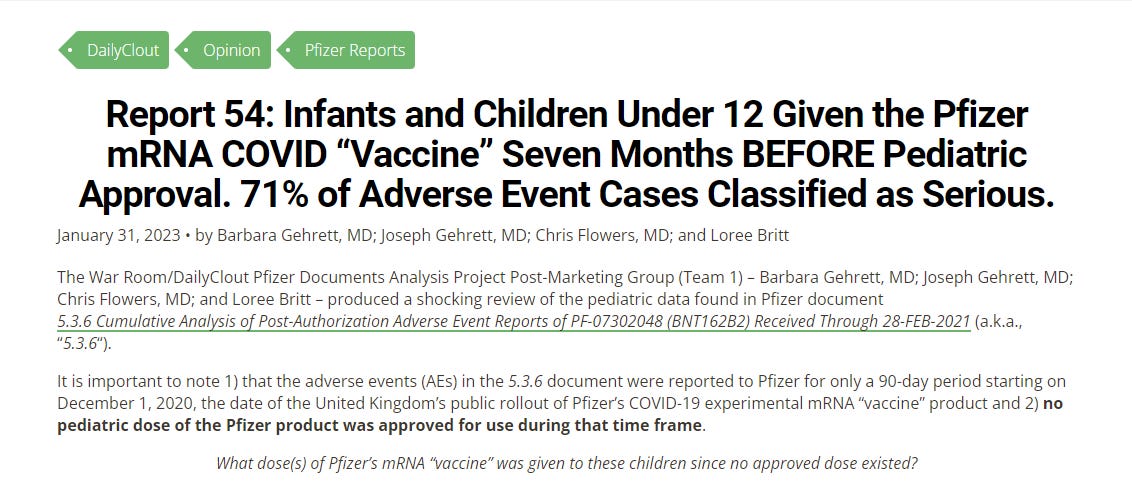
InDocument 5.3.6, Pfizer was aware of 62 cases of children who were injected in the first 90 days after the December 2020 rollout of its C19 injection, several months before emergency use authorization in adolescents. Pfizer excluded 28 cases based on a caveat that their height and weight were “not consistent with pediatric subjects.” Age determines pediatric cases — not height and weight. But of the 34 adverse event cases that remained, 24 (71%) were classified as serious:
- A seven-year-old experienced a stroke.
- One child and one infant suffered facial paralysis.
- One infant had a kidney adverse event, either kidney injury or failure.
- 132 adverse events were reported in the 34 children,an average of 3.88 AEs per child.
This begs the question: from where did those children come? How did Pfizer gain such access to information about its injection in children at this time? And how did children become medical experiments so shortly after the mRNA rollout?
One possible explanation is medical bribery from the likes of university medical centers. What does it take to compel a parent to volunteer his or her child as a human guinea pig? Apparently, fear-based advertising and about $900 — because the University of Rochester Medical Center was inundated with willing parents when it advertised such an offer back in March 2021.
University of Rochester Medical Center to Participate in Pediatric COVID Vaccine Trials
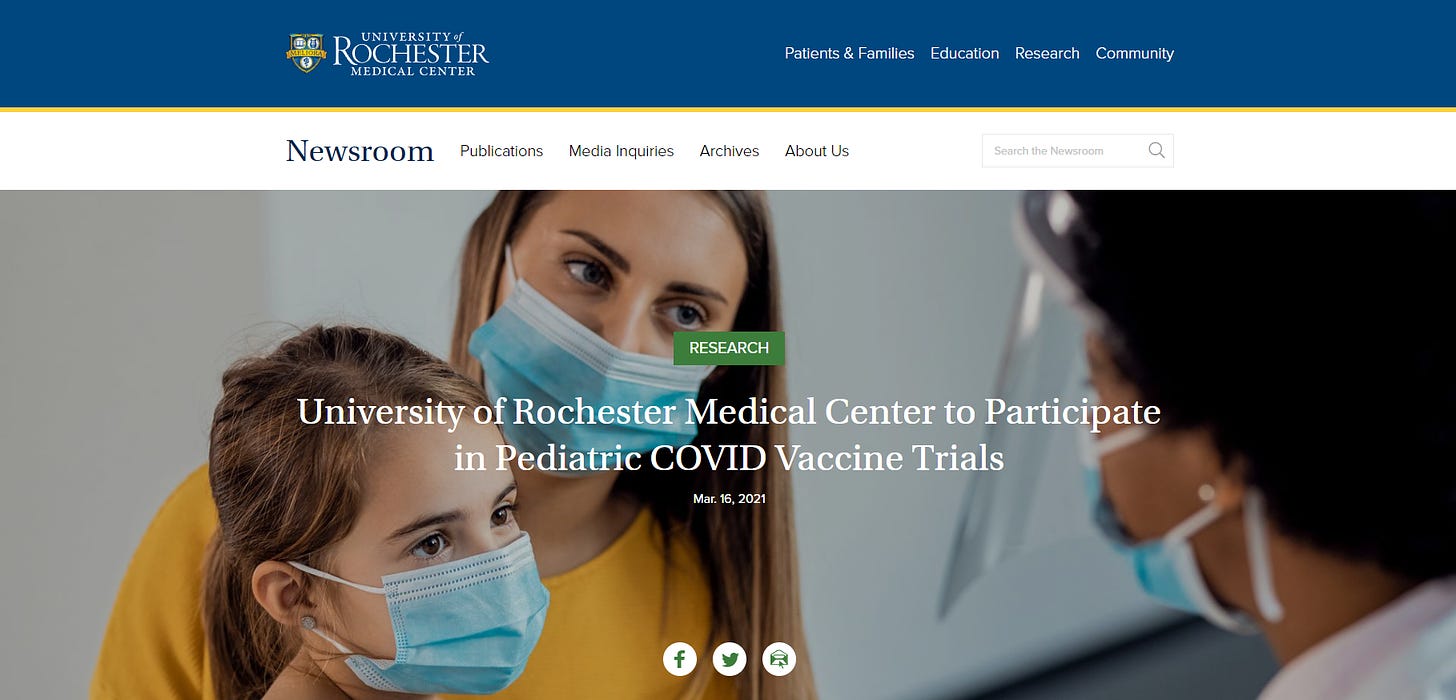
The date, March 16, 2021, is nearly 2 months before the FDA grantedEUA to 12 to 15-year-olds, 7 months before 5 to 11-year-olds, and 14 months before the FDA authorized emergency use down to 6-month babies to 4-year-old children.
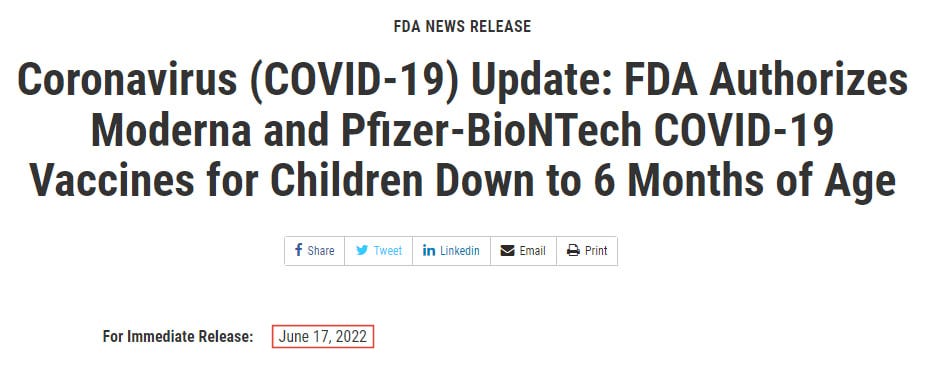
UMRC posted: The University of Rochester Medical Center “plans to test the [C19] vaccine on 200 to 300 volunteers among healthy children aged 6 months to 11 years of age.” The compensation: “as much as $900.”

It wasn’t just the University of Rochester Medical Center conducting such research; other universities were involved, too. In collaboration with the NIH, it was announced that the Moderna C19 injection would be tested on “6,750 kids ages 6 months to 11 years old.”
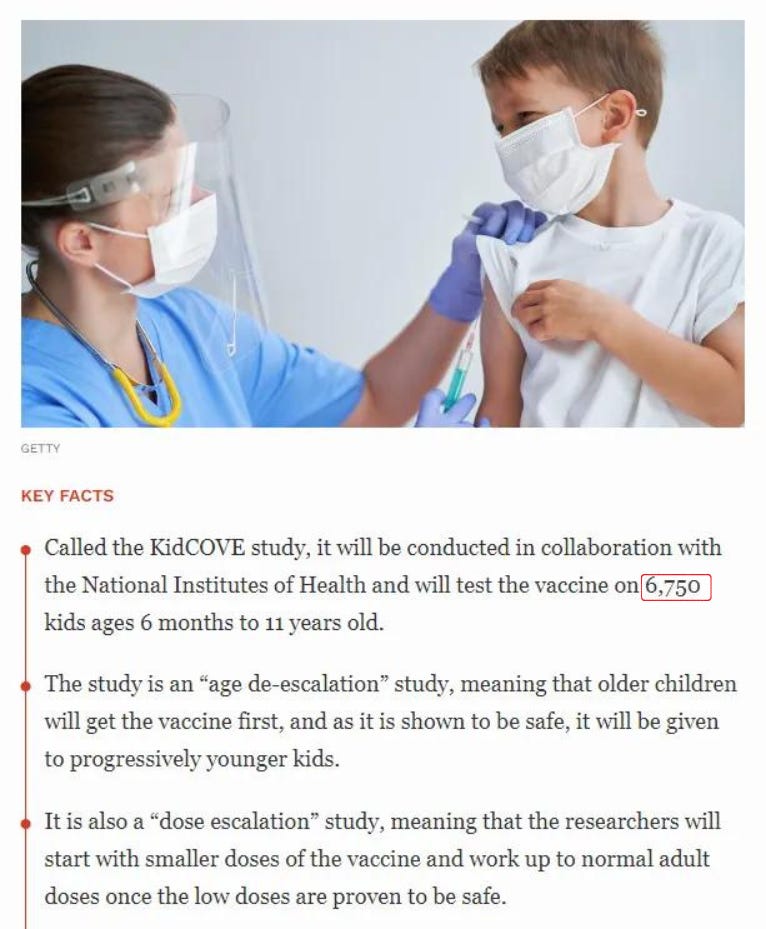
It’s important to note “vaccine development is a long, complex process, often lasting 10-15 years, and involves a combination of public and private involvement,” according to The College of Physicians of Philadelphia. The exploratory phase alone lasts 2 to 4 years — and the pre-clinical stage typically lasts another 1 to 2 years.
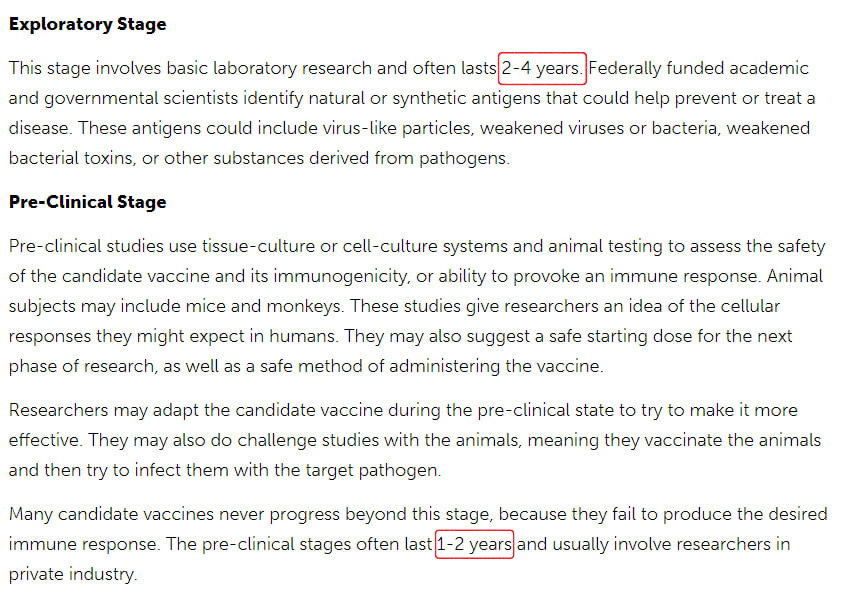
So, skipping straight to babies as young as 6-months-olds — announced three months after mRNA rollout — is highly, highly unusual. And to prey on parents’ fear, tagging their children as spreaders of disease, then offering a lump sum of cash is not up to standard with bioethical norms.

But what about parental choice? Shouldn’t they be allowed to volunteer their children for such trials? Well, is it acceptable for a parent to send his or her young child to work at a factory, sell their organs, or subject them to human trafficking? If these actions are deplorable, then how is it not unethical for a parent to profit from volunteering his or her child for a medical experiment when the child cannot possibly give consent?
Such circumstances bothered popular podcaster and mother Shannon Joy (
) so profoundly that she called the University of Rochester Medical Center while pretending to want to enroll her son to get more details in April 2021. Shannon was connected with a woman by the name of Dawn.

“Center for vaccine research. This is Dawn.”
“Hey, Dawn. How are you?” replied Mrs. Joy — before proceeding to ask three questions: when is the trial going to start? Are you still enrolling? Is it full yet?
Dawn answered, “The last I heard, it was supposed to start, originally, in April [2021] and moved to May. They have had avery robust enrollment— volunteerism turnout. So at this point, I would be surprised if they’re still looking for people.”
“If I were to enroll my son, like if he had allergies or any health conditions, would that be an issue?” inquired Mrs. Joy.
“No,” Dawn replied. “There are certainly going to be health concerns that they would look at, but I think they’re more in line with immunological issues. Allergies — it’s hard to find a child who doesn’t have allergies.”
Shannon Joy dug deeper. “Where are the people [parents and their children] coming from?”
“Honestly, I do not know. I don’t have access to that data,” Dawn responded. “The calls I have received have been primarily [from] Caucasian suburbanites.”
Dawn then reveals, “The last I heard, they had thousands of people who signed up.” The University of Rochester Medical Center is taking “maybe 150 or so.” “There are several hundred people in the study nationwide, and we are just one of several fights.”
“Have you heard about any side effects?” Mrs. Joy asked. “I saw on social media … that a baby died in one of the trials in Virginia. And so, what happens? Will I get paid or any insurance money if something happens?”
“Any health issue that is determined to be a result of being in the study — it would be covered by the study,” Dawn reassured. However, considering that the mRNA manufacturers are not liable, there is a good chance those in charge of the study would not be either.
Shannon Joy pressed further on the subject. “If they [my child] were to die or get really, really sick or have a debilitating, lifelong reaction, will I be paid for that? Or will I be compensated? Is it the hospital that compensates me, or is it Moderna, or how does that work?”
“That’s a good question. And I am afraid I don’t have the answer to that,” Dawn admitted. “I don’t know.”
“Now that I’m thinking about it,” Mrs. Joy said, “I’m a little bit nervous because it could maybe kill my son or hurt him.”
“That’s very, very, very unlikely,” opined Dawn — before chuckling.
“Can they guarantee it won’t hurt him?” Mrs. Joy replied.
“There are no guarantees — but the chances of any harm are very, very slim. Chances of being harmed by COVID have higher than from a vaccine,” Dawn declared.
“So the chances of my son being hurt by COVID is higher than him being hurt by a vaccine?” Mrs. Joy questioned.
“Yes,” Dawn misinformed.
“But how do we know that if we haven’t studied it yet?” retorted Mrs. Joy.
“There have been —long exhale.“Well, like you said, there’s been Pfizer studies out there,” Dawn answered with uncertainty.
“The only one I saw for the Pfizer study was that there was a death of a baby, a two-year-old. I think it was reported. Have you heard of VAERS?” inquired Mrs. Joy. “It’s the Vaccine Adverse Event Report System.”
“No,” admitted Dawn. She then attempted to provide clarification for what the potential adverse events could be. “An adverse event in a clinical study can be anything from ‘you’ve had a cold’ — ‘you broke a leg in a car accident.’ I’ve seen on Twitter people saying, ‘Oh, my God, there are millions of adverse events.’ Well, yeah, if you’ve gotten a sore arm from the vaccine, that gets counted as an adverse event.”
“But is it normal for a two-year-old that is perfectly healthy to die three days after a vaccine?” Mrs. Joy challenged. “Because that was the report. The report wasn’t swelling; it was that she died.”
“I can’t speak to that,” Dawn responded. “I haven’t seen that report. I can get your email address and forward it along to the doctor if you want.”
“Yeah, I’m just feeling now, after talking to you, a little nervous.” Mrs. Joy expressed. “If we haven’t done any long-term studies, and they haven’t done any studies at all in babies, what if this kills babies and children — right here in Rochester? Wouldn’t that be terrible?”
“We’ve seen no evidence of that sort of thing happening,” declared Dawn.
“But we haven’t studied it,” argued Mrs. Joy.
“That’s true,” replied Dawn. “Babies have not been studied under the age of six months.”
“Or over six months,” Shannon Joy added.
“That probably means they would not be starting to give the vaccine to children under six months,” Dawn said to finish her statement.
“But they’re giving it to children over six months — what if they die from it? What if their little bodies can’t handle these chemicals?” questioned Mrs. Joy.
“Well, let me get your email address. And I can forward that along to the doctor, and she can get back [to] you. How’s that sound?” asked Dawn.
“I think that would be good,” articulated Mrs. Joy. “Because, honestly, it almost sounds like human experimentation on babies for money,” she asserted.
Long mutter.“I don’t think that’s true,” opined Dawn.
“But if you can’t guarantee that the baby isn’t going to die or be injured, severely injured, then is it ethical?” Mrs. Joy challenged.
“They wouldn’t be doing pediatric studies if they had that concern,” asserted Dawn.
“But I even looked on the FDA [website], and they haven’t studied these mRNA technologies — they’ve only been studied [for] less than a year,” Mrs. Joy countered.
“That’s true,” Dawn yielded.
“So what about fertility?” Mrs. Joy continued.
“I have a son, but what if this affects them long-term or their immune systems long-term, or their fertility?” Mrs. Joy questioned. “With no long-term studies? It sounds —”
“Well, I’m just [inaudible] at the front desk,” Dawn interrupted. “So why don’t I get your email address.”
Shannon Joy then disclosed her phone number and email address to Dawn (removed from the audio) forDr. Casertato get back to Mrs. Joy.
-Call Ends-
Source: University Hospitals Paid Parents $900 to Subject Their Babies to COVID Shots a Year Before EUA
